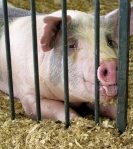 Do I need to take special caution when visiting petting zoos, zoos, or county fairs? Visits to petting zoos and county fairs provide a fun experience for children and adults. Eating, drinking or simply bringing food into an animal-holding area can increase your risk of foodborne illness. In fact, people who eat or drink in areas where animals are being held are almost five times more likely to get ill than people who don’t eat or dink there. Studies have also shown that kids who sucked their thumbs or a pacifier or drank from a sippy cup in those places were 26 times more likely to become sick.
Do I need to take special caution when visiting petting zoos, zoos, or county fairs? Visits to petting zoos and county fairs provide a fun experience for children and adults. Eating, drinking or simply bringing food into an animal-holding area can increase your risk of foodborne illness. In fact, people who eat or drink in areas where animals are being held are almost five times more likely to get ill than people who don’t eat or dink there. Studies have also shown that kids who sucked their thumbs or a pacifier or drank from a sippy cup in those places were 26 times more likely to become sick.
The increase in animal exhibit-related cases of intestinal disease may be tied to the growing population shift from rural to urban environments, of which Ohio is a prime example. As a result, interactions between humans and farm animals have changed from frequent daily activities associated with farm life to less frequent events that are clustered in space and time, such as visits to petting zoos and state and county fair exhibits.
The problem is that even healthy farm animals can be excreting microorganisms that cause serious human diseases. Since these microorganisms are microscopic it’s not possible to know if they are contaminating a surface, food or water by just looking at it. Also many of these organisms can survive for extended periods of time in the environment attached to dust and debris, which can then contaminate food, beverages, food wrappers and drinking straws. You don’t need to get manure in your hand to become exposed to these pathogens.
What can you do to minimize the risk of infection?
 Follow these two main precautions – properly wash their hands and refrain from eating or drinking in areas with animals.
Follow these two main precautions – properly wash their hands and refrain from eating or drinking in areas with animals.
- Hand-washing is the single most important factor in preventing disease. The best way to wash your hands is to use large amounts of water, preferably warm, and soap. Hands should be washed for at least 20 seconds and dried with a single-use paper towel.
- Food and drinks should be stored and consumed in areas completely separated from where the animals are held and only consumed after thoroughly washing hands.”
Waterless hand sanitizers should only be used if there are no other means of washing hands, as these have not done been documented as effective in animal environments.
Written by: Pat Brinkman, Extension Educator, Family & Consumer Sciences, Ohio State University Extension.Caution
Source: Espinoza, M. (2005). “Disease-causing Germs are Common at Fairs,” Ohio State University

